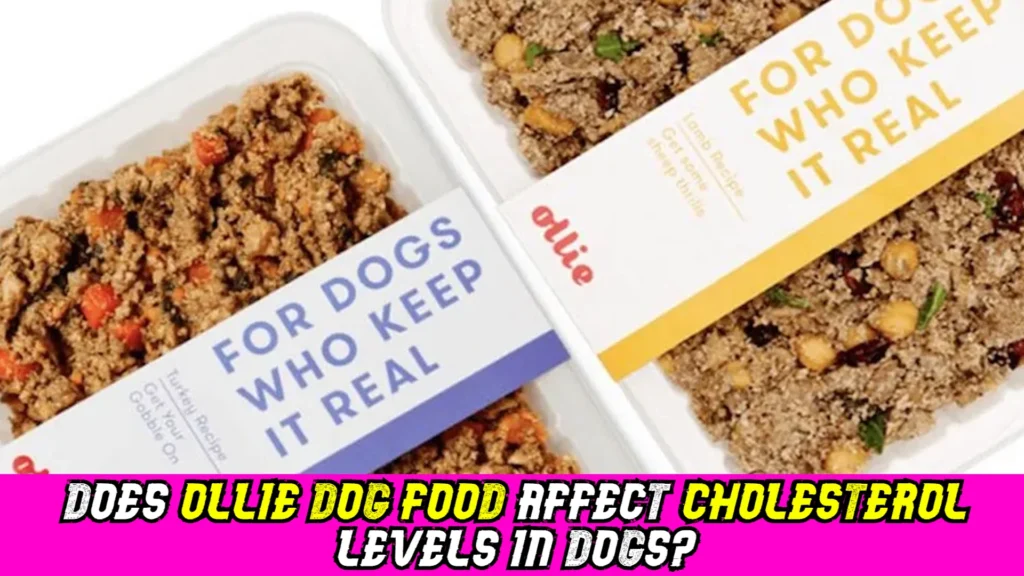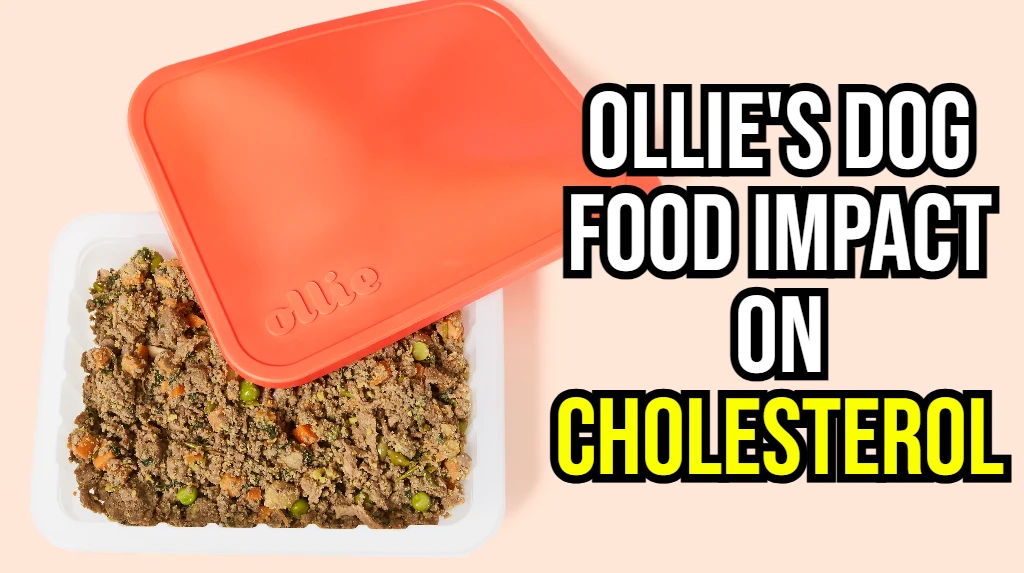Welcome to our comprehensive guide exploring the impact of Ollie dog food on cholesterol levels in canines. In recent years, pet owners have become increasingly mindful of their furry companions’ dietary needs, especially concerning specialized dog foods.

Ollie, a popular brand in this arena, has garnered attention for its nutritional benefits. This post aims to delve deep into how Ollie’s Pet food influences cholesterol levels in dogs, offering insights for those concerned about their pet’s health and diet.
Does Ollie Dog Food Affect Cholesterol Levels in Dogs?
To answer directly: Yes, Ollie dog food can affect cholesterol levels in dogs. Its high-quality ingredients and balanced nutritional profile are designed to support overall health, including the management of cholesterol levels.
However, the specific impact varies based on each dog’s unique health conditions, age, and breed.
What is Cholesterol in Dogs?
Role in Canine Health:
Cholesterol, a type of lipid, is vital for dogs, as it’s involved in building and maintaining cell membranes, hormone production, and aiding in fat digestion.
Unlike in humans, high cholesterol levels in dogs are less commonly linked to heart disease, but they can indicate other health issues.
Types of Cholesterol:
- HDL (High-Density Lipoprotein): Often termed ‘good cholesterol,’ HDL helps transport cholesterol from the body’s tissues back to the liver, where it’s broken down. High levels of HDL are generally beneficial for dogs.
- LDL (Low-Density Lipoprotein): Known as ‘bad cholesterol,’ LDL carries cholesterol to body tissues. Elevated LDL levels can be harmful, potentially leading to conditions like pancreatitis in dogs.
Diet and Cholesterol

A dog’s diet plays a crucial role in managing cholesterol levels. Diets high in fats, particularly saturated fats, can increase LDL levels, whereas foods rich in omega-3 fatty acids can boost HDL levels.
Commercial dog foods vary in fat content and quality. Diets with excessive fat or poor-quality ingredients can lead to increased LDL cholesterol, while balanced diets help maintain optimal cholesterol levels.
Ollie Dog Food: Ingredients and Nutritional Benefits
- High-Quality Proteins: Ollie dog food typically includes premium proteins like chicken, beef, or lamb, which are essential for muscle development and overall health.
- Healthy Fats: Incorporating sources of good fats, such as fish oil, which are rich in omega-3 fatty acids, can enhance HDL cholesterol and support a healthy coat and skin.
- Fruits and Vegetables: Ingredients like sweet potatoes, peas, and blueberries provide essential vitamins, minerals, and antioxidants, promoting overall well-being.
Nutritional Analysis
Ollie dog food is formulated to offer a balanced ratio of proteins, fats, and carbohydrates, catering to a dog’s nutritional needs while maintaining healthy cholesterol levels.
By keeping saturated fats to a minimum, Ollie helps manage LDL cholesterol levels.
Comparative Analysis
Comparing Ollie’s nutritional profile with other dog food brands, particularly in terms of fat quality and quantity, shows how it might be more effective in managing cholesterol levels.
Ollie Dog Food’s Impact on Canine Cholesterol

Scientific Evidence and Research
While specific studies on Ollie dog food and cholesterol might be limited, examining research on similar dietary compositions can provide insights into how such diets impact canine cholesterol levels.
Veterinary Opinions
Veterinarians often recommend diets like Ollie’s for dogs with elevated cholesterol, noting its balanced nutritional content and high-quality ingredients. They might also highlight the importance of tailoring the diet to individual dogs based on their health status, age, and breed.
FAQs
Is Ollie dog food suitable for dogs with high cholesterol?
Ollie dog food, with its balanced and tailored recipes, can be suitable for dogs with high cholesterol. However, it’s essential to consult with a veterinarian for a personalized diet plan.
How quickly can Ollie dog food impact my dog’s cholesterol levels?
Changes in cholesterol levels can be observed within a few months, but this varies depending on the individual dog and its health condition.
Can Ollie dog food replace medication for cholesterol management in dogs?
While a healthy diet is crucial, it should not replace medications prescribed by a veterinarian. Ollie dog food can complement medical treatment for cholesterol management.
Conclusion
Choosing the right diet for your dog is pivotal, especially when it comes to managing health conditions like high cholesterol. Ollie dog food, with its focus on quality ingredients and balanced nutrition, presents a viable option for many pet owners.
However, it’s essential to remember that each dog is unique, and dietary needs can vary. We recommend consulting with a veterinarian for tailored advice, ensuring your furry friend gets the best possible care.
Read also:



0 Comments